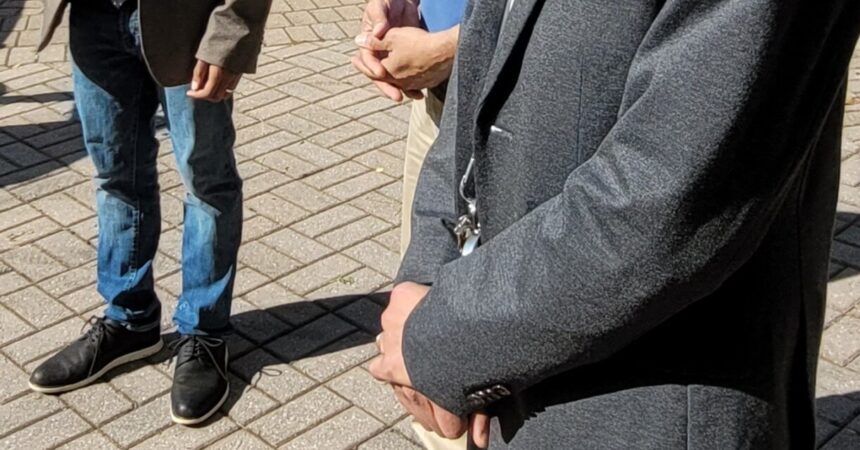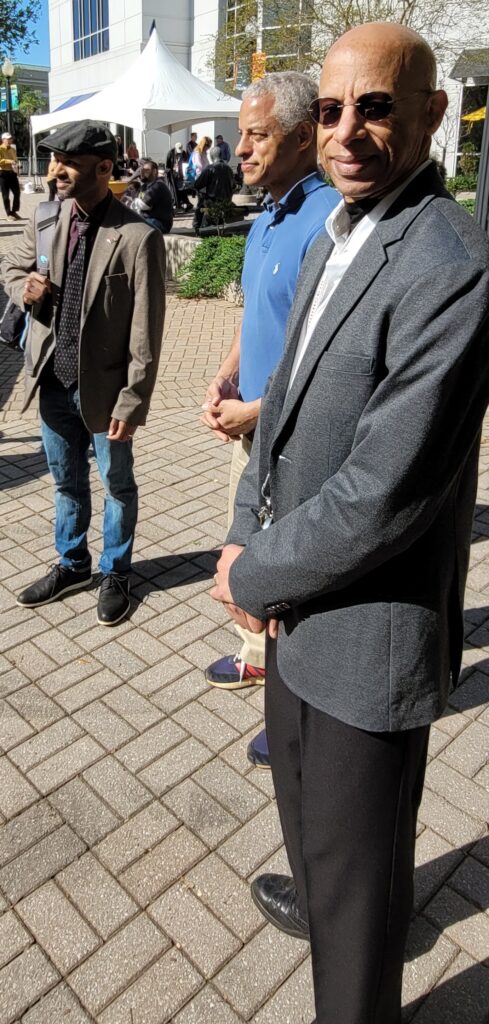
Festival highlights different views of history

Photo by St. Clair Murraine
By St. Clair Murraine
Outlook Staff Writer
An idea that came out of a meeting about inclusion and diversity came to fruition when more than 40 exhibitors gave hundreds who showed up at Kleman Plaza a view of history that most had never seen.
Tallahassee Community College partnered with several history organizations to stage the first Tallahassee History Festival.
It turned out to be a day that focused on state, regional and local history. Bits of Black History were also shared by exhibitors and presenters.
Seeds for the events were planted during an inclusion meeting with TCC President Jim Murdaugh. The day turned out to be what organizers envisioned, said David Proctor, who co-chair the event with Teresa Paliwoda.
They wanted “a broad based history festival, bring all the history – African American, Native American, women, Hispanic, European, American; everything that’s in here,” Proctor said.
The event was a success, said Paliwoda, because they brought together exhibitors who shared stories on different aspects of history.
“A lot of time people will do a history fair project on the atomic bomb, but why not look at Mabry Airfield and try to do something local,” she said. “We have tons and tons of information and that’s what we were hoping; children grow up knowing more about their community.”
The longest presentation on stage was in the stories that Dr. A.J. Brickler, III. Told about the Tuskegee Airmen, the first black military pilots in the United States. He also shared stories about how his family is rooted in Black history.
Other presentations were made by Althemese Barnes, retired director of the Riley House, and Delaitre Hollinger, who represented the National Association for the Preservation of African-American History and Culture. Members of TCC faculty and students were recruited to assist with the event.
Barnes, who ran the Riley House for more than two decades, said the assembly of different history organizations was one of the largest she’s seen in the city.
“I think it’s a great thing,” she said. “It is so important to do this because some problems that we deal with socially and otherwise is probably because you don’t know who we are. If people would take time to study it could help explain how we live as people.”
Responding to the question of critical race theory, Barnes said the festival came at a perfect time. The state legislature recently pass a bill that is considered sensor on how Black history is taught.
In general terms, critical race theory is based on the premise that racism is embedded in American society and institutions.
“I think there is a misunderstanding about that critical race theory,” Barnes said. “Someone asked me what are you going to do about critical race theory. I said all we are going to do is keep teaching history. History has nothing to do about anything critical or hurting anybody or whatever.”
Dana McMillan made the trek from Gadsden County with her 11-year-old son Jalen, hoping to see and hear more about Black history as it relates to the state. She found there wasn’t much among the exhibitors.
“I brought him here so that he can learn Florida history,” she said. “I thought there would be more African-American or Black exhibits. I’ve only seen one, but I thought it would be a good opportunity for him to come and learn about the state that we live in.”
Hollinger called the event “the greatest thing that our city could have done.” He added that such events are especially important because of the uproar over how Black history.
“It’s important because we are at a point in our history where there are different actions that are being taken by the legislature and other entities to make it less important for kids in K through 12, colleges and universities to know their history,” Hollinger said. “Having community events like this are important where we have the community come out and listen to speakers and presenters.”
One of the most informative presentations among the exhibits was a display by Tallahassee’s Dale Mabry Army Air Field Museum. Chuck Wells, chairman and co-founder of the organization spent most of his time at the plaza explaining several stories, including how Tallahassee was a military town for several years during the 1940’s.
Well went on to explain that TCC is on land where the Dale Mabry Military Airfield was located. He was glad to be there telling the story of Mabry, a Tallahassee native who was a World War I veteran.
“I estimate that 90 percent of Tallahasseeans don’t know anything about the fact that we were a war town in World War II,” Wells said. “This (the festival) is huge exposure for us.”







